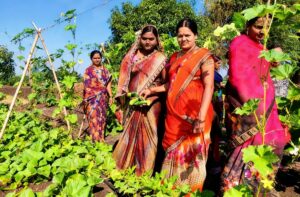Investment, innovation, and empowering the world’s most vulnerable populations are required to establish a rice production system that adapts to climate change, without disturbing the sustainability of our natural resource base. Redesigning technologies, delivery systems and policies prove to be the most effective approach for ensuring food security in the most vulnerable areas. The immense need is to set up sustainable and resilient food production systems that are capable of ensuring food security for future generations.
.
The vulnerability of any society towards poverty and hunger is a multifaceted phenomenon. It depends upon the population structure, technological developments, policy implications, social behavior, land and water use patterns, economic status and cultural composition. The resource-poor farmers in stress-prone areas are highly vulnerable to poverty and hunger. The stresses such as drought, submergence, salinity, heat and cold lead to the frequent destruction of crops imposing farmers to leave their fields fallow, and thereby converting them to dependent laborers.
The farmers from stress-prone areas are frequently subjected to chronic deprivations such as hunger and malnutrition, poor health, limited education, marginalization, lacking the resilience to cope with economic setbacks and natural disasters. Women, children and elderly in particular are highly vulnerable to shocks driven by abiotic stresses. Moreover, the recurrent occurrence of these shocks reduces the propensity of farmers to adopt new and profitable technologies, increasing the vulnerability and depleting their capability to overcome hunger and poverty.
The abiotic stresses disproportionately affect the underprivileged farmers, resulting in reduction of their consumption, withdrawing their children from schools, and inflicting them to emigrate for source of livelihood to meet the instant needs.
Due to long-term adverse effects of climate change, the frequency, intensity and duration of abiotic stresses are anticipated to step-up in the coming years of this century, posing serious threats to crop production and global food security. Besides, abiotic stresses have been aggravated due to the constant population growth along with urbanization and the need to obtain a range of services from agriculture in addition to food production.
The present scenario of farming in stress-prone areas require major innovations to transform the existing practices of food production, distribution and consumption. The agricultural systems in these areas need to be modified for addressing the existing challenges to ensure the pertinent increase in food production.
Farmers will have to produce substantially large amount of food on less land, with less water, using less energy, fertilizers and pesticides without disturbing the ecological systems. The scientific community need to play an important role in ascertaining the strategic investments in stress prone areas to set up resilient agricultural production systems, reduce greenhouse gas emissions, ensure well organized use of resources and safeguard adequate nutrition. The present need is to enhance the productivity of major food crops in the regions highly prone to various types of environmental perturbations.
Investment, innovation and empowering the world’s most vulnerable populations is required to establish a rice production system that adapts to climate change, without disturbing the sustainability of our natural resource base. Smashing investments for the sustainability of rice production in stress prone areas form the essential component of long-term economic development. The sooner these investments are accomplished, the greater the gains are expected.
Science and technology need to play an essential role in meeting the challenge of moving the globe into safe operating space where agriculture can satisfy the food needs of every single individual, especially those living in agriculturally marginal ecosystems. Science, technology and innovations coupled with strategic planning can help the world’s poor to overcome the problem of poverty and hunger.
Although, technological innovation has contributed significantly towards the development of stress-tolerant rice varieties (STRVs) showing tolerance to different types of abiotic stresses, the imperative need is to ascertain strategic plans for the development of varieties possessing multiple stress tolerance. Moreover, the most important challenge for current system of agriculture and seed production is that the dissemination and adoption STRVs is low mainly due to the lack of information and non-availability of seeds amongst farmers.
The existing system of agricultural extension and seed supply need to be aligned in a way to successfully deliver the proven stress tolerant technology to farmers. Agricultural extension system needs reformations to enhance the diffusion and adoption of STRVs. Research based strategies ought to be implemented so that STRVs are adopted at a scale where it can achieve maximal benefits. Strategic and intentional collaborations should be ensured for enhancing the diffusion of STRVs to farmers.
Under the scenario of climate change and its impact on agricultural crop productivity, the anticipated food insecurity in the future necessitates the production of a substantially large amount of food on limited resources without disturbing the ecological systems. Recent technological innovations in crop breeding have significantly contributed by developing STRVs that have the potential to ensure the food secure future sustainably.
Redesigning technologies, delivery systems and policies prove to be the most effective approach for ensuring food security in the most vulnerable areas. The immense need is to set up the sustainable and resilient food production systems that are capable of ensuring food security for future generations.
Read the study:
Dar MH, Bano DA, Waza SA, Zaidi NW, Majid A, Shikari AB, Ahangar MA, Hossain M, Kumar A, Singh A. (2021) Abiotic stress tolerance-Progress and pathways of sustainable rice production. Sustainability. 13(4):2078.






